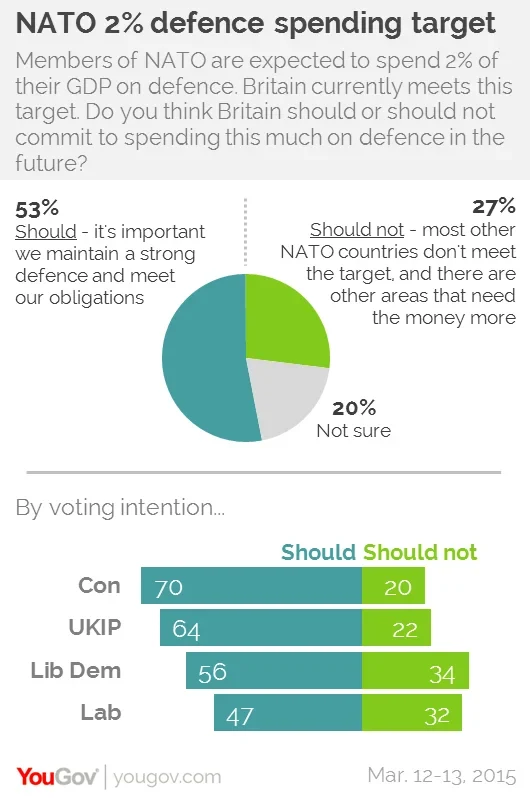A majority of voters think Britain should commit to spending 2% of GDP on defence in the future
At last year’s NATO summit in Wales David Cameron boasted that Britain was one of only our NATO members keeping to the alliance’s guideline on military spending, which advises members to spend at least 2% of GDP on defence. However, the prime minister has since resisted calls to commit Britain to meeting the target after 2016, when defence spending will next be reviewed. Labour’s shadow defence minister, Kevan Jones, has also demurred when asked if his party would keep the commitment.
A new YouGov poll for the Sunday Times finds that if it were up to the general public, Britain would commit to spending 2% on defence in the future. 53% say Britain should meet the NATO target to “maintain a strong defence and meet our obligations”, twice the number who disagree. 20% are undecided.

Support for the commitment extends mostly across party lines. Fully seven in ten Conservatives want the target met, along with two-thirds of UKIP voters, 56% of Lib Dems and nearly half of Labour voters (only 32% of Labour voters are opposed to the target).
More generally, 47% think the cuts to defence spending made in recent years have been “too deep”, against only a third who think the cuts have been too shallow (12%) or have got the balance right (21%). Similarly, in a survey two weeks ago 49% said the UK spent too little on defence, and in a major study YouGov conducted with Chatham House last year 63% of the public said the UK should ‘seek to remain a great power, with substantial armed forces’.
Priorities
Importantly, spending decisions are not made in a vacuum. Up against other spending priorities, just one in four voters name defence as one of three areas that should be protected from cuts, putting it on level with pensions (27%), but behind crime and policing (35%), education and schools (50%) and the NHS (79%).
On the other hand, defence spending clearly takes priority over Britain’s spending commitments for overseas aid. 59% say Britain should not commit to spending 0.7% of National Income on aid to developing countries, a target set by the United Nations in 1970.
Britain is currently the only G7 country meeting the target, and this month MPs voted to enshrine it in law.
PA image








